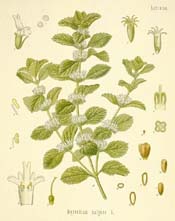
Botanical.com Home Page

|
Horehound
(Marrubium vulgare LINN.)
|
Horehound, White
Botanical: Marrubium vulgare (LINN.)
Family: N.O. Labiatae
---Synonym---Hoarhound.
---Part Used---Herb.
---Habitat---White Horehound is a perennial herbaceous plant, found all over Europe and indigenous to Britain. Like many other plants of the Labiate tribe, it flourishes in waste places and by roadsides, particularly in the counties of Norfolk and Suffolk, where it is also cultivated in the corners of cottage gardens for making tea and candy for use in coughs and colds. It is also brewed and made into Horehound Ale, an appetizing and healthful beverage, much drunk in Norfolk and other country districts.
---Description---The plant is bushy, producing numerous annual, quadrangular and branching stems, a foot or more in height, on which the whitish flowers are borne in crowded, axillary, woolly whorls. The leaves are much wrinkled, opposite, petiolate, about 1 inch long, covered with white, felted hairs, which give them a woolly appearance. They have a curious, musky smell, which is diminished by drying and lost on keeping. Horehound flowers from June to September.
The Romans esteemed Horehound for its medicinal properties, and its Latin name of Marrubium is said to be derived from Maria urbs, an ancient town of Italy. Other authors derive its name from the Hebrew marrob (a bitter juice), and state that it was one of the bitter herbs which the Jews were ordered to take for the Feast of Passover.
The Egyptian Priests called this plant the 'Seed of Horus,' or the 'Bull's Blood,' and the 'Eye of the Star.' It was a principal ingredient in the negro Caesar's antidote for vegetable poisons.
Gerard recommends it, in addition to its uses in coughs and colds, to 'those that have drunk poyson or have been bitten of serpents,' and it was also administered for 'mad dogge's biting.'
It was once regarded as an anti-magical herb.
According to Columella, Horehound is a serviceable remedy against Cankerworm in trees, and it is stated that if it be put into new milk and set in a place pestered with flies, it will speedily kill them all.
---Cultivation---White Horehound is a hardy plant, easily grown, and flourishes best in a dry, poor soil. It can be propagated from seeds sown in spring, cuttings, or by dividing the roots (the most usual method). If raised from seed, the seedlings should be planted out in the spring, in rows, with a space of about 9 inches or more between each plant. No further culture will be needed than weeding. It does not blossom until it is two years old.
Until recently, it was chiefly collected in Southern France, where it is much cultivated. It is in steady demand, and it would probably pay to cultivate it more in this country.
White Horehound is distinguished from other species by its woolly stem, the densely felted hairs on the leaves, and the tentoothed teeth of the calyx.
[Top]
---Constituents---The chief constituent is a bitter principle known as Marrubium, with a little volatile oil, resin, tannin, wax, fat, sugar, etc.
- ---Medicinal Action and Uses---White Horehound has long been noted for its efficacy in lung troubles and coughs. Gerard says of this plant:
- 'Syrup made of the greene fresh leaves and sugar is a most singular remedie against the cough and wheezing of the lungs . . . and doth wonderfully and above credit ease such as have been long sicke of any consumption of the lungs, as hath beene often proved by the learned physitions of our London College.'
- And Culpepper says:
- 'It helpeth to expectorate tough phlegm from the chest, being taken with the roots of Irris or Orris.... There is a syrup made of this plant which I would recommend as an excellent help to evacuate tough phlegm and cold rheum from the lungs of aged persons, especially those who are asthmatic and short winded.'
Preparations of Horehound are still largely used as expectorants and tonics. It may, indeed, be considered one of the most popular pectoral remedies, being given with benefit for chronic cough, asthma, and some cases of consumption.
Horehound is sometimes combined with Hyssop, Rue, Liquorice root and Marshmallow root, 1/2 oz. of each boiled in 2 pints of water, to 1 1/2 pint, strained and given in 1/2 teacupful doses, every two to three hours.
For children's coughs and croup, it is given to advantage in the form of syrup, and is a most useful medicine for children, not only for the complaints mentioned, but as a tonic and a corrective of the stomach. It has quite a pleasant taste.
Taken in large doses, it acts as a gentle purgative.
The powdered leaves have also been employed as a vermifuge and the green leaves, bruised and boiled in lard, are made into an ointment which is good for wounds.
For ordinary cold, a simple infusion of Horehound (Horehound Tea) is generally sufficient in itself. The tea may be made by pouring boiling water on the fresh or dried leaves, 1 OZ. of the herb to the pint. A wineglassful may be taken three or four times a day.
Candied Horehound is best made from the fresh plant by boiling it down until the juice is extracted, then adding sugar before boiling this again, until it has become thick enough in consistence to pour into a paper case and be cut into squares when cool.
Two or three teaspoonsful of the expressed juice of the herb may also be given as a dose in severe colds.
---Preparations and Dosages---Fluid extract, 1/2 to 1 drachm. Syrup, 2 to 4 drachms. Solid extract, 5 to 15 grains.
[Top]
Common Name Index
A MODERN HERBAL Home Page
Bear in mind "A Modern Herbal" was written with the conventional wisdom of the early 1900's. This should be taken into account as some of the information may now be considered inaccurate, or not in accordance with modern medicine.
© Copyright Protected 1995-2024 Botanical.com
|

